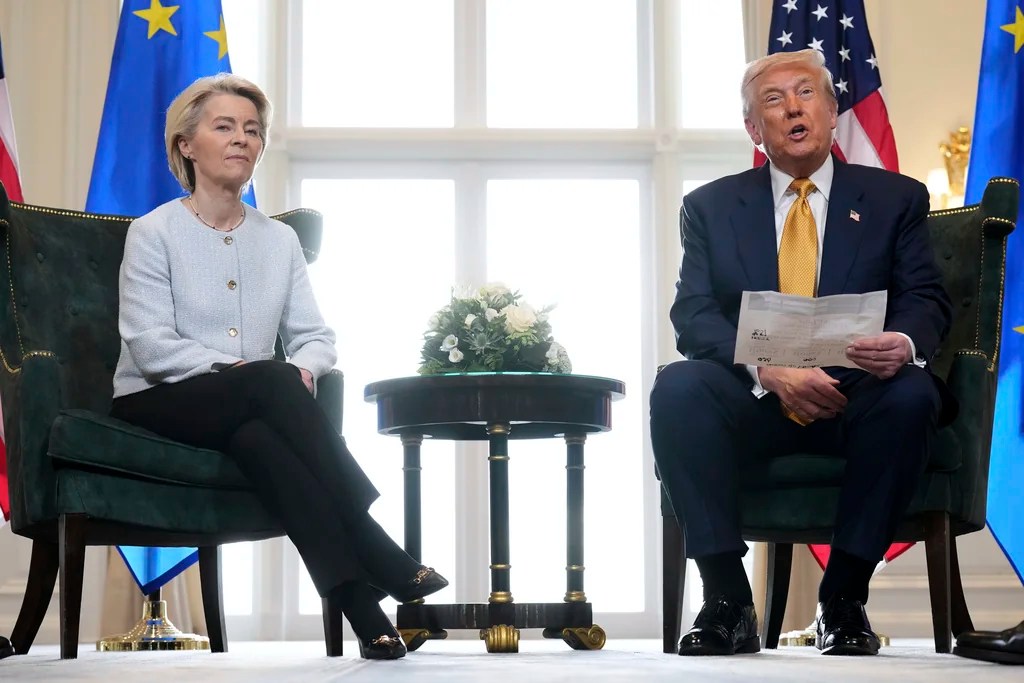


Recently, the White House announced that it had reached a landmark trade deal with the European Union, promising EU purchases of $750 billion in U.S. energy, among other provisions to strengthen our energy independence and dominance. However, as President Donald Trump vows to continue to “unleash American energy” and create more well-paying jobs, new energy and climate regulations coming out of Brussels pose a grave threat to this goal.
The EU’s recently adopted Corporate Sustainability Due Diligence Directive, or CSDDD, places extreme due diligence requirements on American companies, mandating companies to evaluate their entire supply chains for possible abuses as defined by the United Nations and the Organization for Economic Cooperation and Development. Not only does this infringe on American jurisdictional authority for energy-related and other economic activity, but it threatens our global competitiveness and position with our allies, putting U.S. companies at a disadvantage. As a former ambassador to the Organization for Security and Cooperation in Europe, we must maintain our geopolitical and economic alliance with Europe, which requires policymakers to revise the CSDDD and assert our energy and regulatory independence.
Recommended Stories
- Trump's Medicaid reform is moral and necessary
- The science of climate change is far from 'settled'
- China could weaponize medicine supply chains against America
The CSDDD imposes significant disclosure burdens on companies, which will necessarily include American companies operating globally. Going beyond U.S. corporate governance law, the CSDDD requires companies to identify, prevent, mitigate, and account for negative human rights and environmental impacts within their operations, subsidiaries, and value chains. Not only EU-based companies but also non-EU companies that generate 450 million euros or more in net turnover in the EU are also subject to liabilities of up to 5% of the company’s net turnover.
This, therefore, threatens more than $975.9 billion in goods and services from American companies traded with the EU as of 2024, according to the U.S. Trade Representative. Yet, more importantly, taxing up to 5% of a company’s net turnover globally singles out U.S. companies for their activities wholly outside of EU jurisdiction, putting us at a disadvantage to our European counterparts.
With sectors ranging from tech to finance, healthcare, and automotive, the CSDDD rules in particular will also single out American oil and gas companies that export to and operate in Europe, which provide the single-largest U.S.-exported good to Europe at $64.55 billion. Such burdens would take away from American companies’ ability to invest in research and development and innovate to make such in-demand energy more efficient, cost-effective, and lower costs, and increase jobs here in the United States.
Further, these requirements are reminiscent of the Securities and Exchange Commission’s climate disclosure rules last year, which, after adoption, were stayed and eventually abandoned earlier this year by the SEC itself. Like the CSDDD, the SEC’s climate disclosure rule went far beyond to weaken our economic competitiveness, create unnecessary complexity, and threaten big and small businesses alike. Since the CSDDD also taxes non-EU activities, it will hurt American big and small businesses even more than those in Europe.
Yet, unlike the SEC’s climate disclosure law, the CSDDD de facto extends EU laws beyond Europe, forcing American companies to comply with rules that have not been ratified by Congress or American regulators. This threatens American sovereignty and endangers our otherwise close economic and geopolitical relationship with Europe, which must be balanced and protected. This will also drive up compliance costs here in the U.S., threatening all economic activities domestically on a scale that European companies would not face. This is why the U.S. Chamber of Commerce this spring sent a letter to the Treasury Secretary Scott Bessent and National Economic Council Director Kevin Hassett asking that the administration “urge the EU to limit application of CSDDD to the European market.”
This is in line with other congressional concerns over the CSDDD, following a letter from Senate Banking Committee Chairman Tim Scott (R-SC), House Financial Services Committee Chairman French Hill (R-AR), and others. In this letter, Scott and others stated that “these principles have not been ratified by Congress, raising concerns about the legitimacy of EU enforcement against U.S. companies based on these principles.”
TRUMP’S TIKTOK DEAL ‘HOSTAGE’ TO CHINA TRADE TALKS AS DEADLINE LOOMS
Not only does this affect a major source of American GDP and trade, but downstream effects on the supply chain will make it harder for businesses to operate successfully domestically. This is in part why Sen. Bill Hagerty (R-TN) introduced the Prevent Regulatory Overreach from Turning Essential Companies into Targets (PROTECT USA) Act of 2025, which would shield U.S. companies from this harmful extraterritorial regulation.
As an economically harmful piece of extraterritorial legislation that will disproportionately harm U.S. businesses, the Trump administration must continue to deal with the Europeans to block the CSDDD’s negative effects on U.S. trade in energy and other products. Protecting American sovereignty will strengthen our geopolitical relationships and position, increase economic competitiveness, and protect our national and energy security going forward.
James S. Gilmore III was the 68th governor of Virginia and a former U.S. ambassador to the Organization for Security and Co-operation in Europe.
